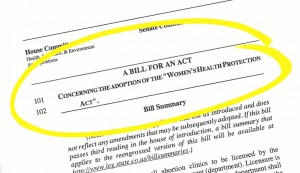by Austin Montoya, Social Media and Online Coordinator
On Thursday, HB15-1128, the “Women’s Health Protection Act” will be heard by the Colorado House. The bill, deceptively named, would pose a threat to Coloradan’s health by hindering access to a broad range of women’s health services and family-planning services, such as birth control.
 HB15-1128 would require any clinic that provides abortion services to obtain special “clinic licenses.” This would create unnecessary red tape and restrict access to needed health services in the state. The bill would also establish onerous, unnecessary new standards for facilities, such as employing a doctor with admitting privileges at a hospital within 30 miles. These regulations would pose an amplified risk to individuals seeking quality health care, especially those living in rural areas, by forcing them to travel long distances. A similar law, passed in Texas in 2013, shut down numerous health clinics and similar consequences could be expected here in Colorado.
HB15-1128 would require any clinic that provides abortion services to obtain special “clinic licenses.” This would create unnecessary red tape and restrict access to needed health services in the state. The bill would also establish onerous, unnecessary new standards for facilities, such as employing a doctor with admitting privileges at a hospital within 30 miles. These regulations would pose an amplified risk to individuals seeking quality health care, especially those living in rural areas, by forcing them to travel long distances. A similar law, passed in Texas in 2013, shut down numerous health clinics and similar consequences could be expected here in Colorado.
These clinics, which serve thousands of individuals yearly, provide services including breast and cervical cancer screenings, prenatal care, parent coaching, family planning, HIV testing and LGBT services. Underscoring the importance of these services is the fact that survival rates for women who detect cervical cancer early rises to 92%, and to 98% for early detection of breast cancer. These facilities are central to our health care delivery system and are a crucial source of medical care for low-income Coloradans.
The contraceptive services that are provided have also dramatically reduced the amount of unplanned pregnancies in the state and can lead to lower abortion rates. For example, Colorado’s teen birth rate plummeted 40 percent between 2009 and 2013, thanks mostly to the Colorado Family Planning Initiative, which provided 30,000 contraceptive implants or intrauterine devices (IUDs) at low or no cost to low-income women at 68 family-planning clinics across the state.
The positive influences these facilities have on Coloradans go beyond simply providing basic health care. Women and others who have access to the health services they need have better health outcomes overall, are less likely to utilize public services like food stamps, and have more power to make the decisions that are right for their own lives.
HB15-1128 would impose costly burdens in clinics in order to push care out of reach for many low-income and vulnerable Coloradans. We should be eliminating barriers to the care people need, not imposing more.
